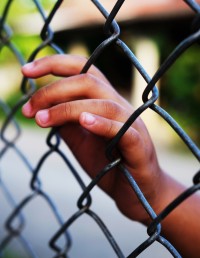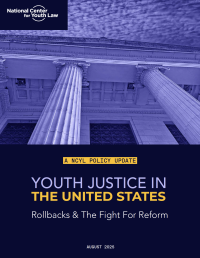Los Angeles County: Less talk, more action - reimagine youth justice now
By Frankie Guzman
This summer, Los Angeles County allocated $410 million to its probation department for youth incarceration, even though its population of detained youth was around 400.
One million dollars is enough to pay tuition for 21 students to attend UCLA for a year — with housing, meals, transportation, and insurance included — and still have money left over. Instead, Los Angeles County is spending more than that, per child, to fund a juvenile justice system that county leaders agree is both traumatic and dehumanizing for young people.
Children and youth suffer devastating harm to their physical, emotional, and developmental wellbeing due to justice system involvement and incarceration. Further, Black and Brown children are disproportionately impacted at every point in the juvenile justice process. The damage is lasting and costly to youth, their families, their communities — and society at-large.
If county leaders are truly as committed as they claim to transforming that harmful and ineffective system, they will need to back up their words with resources and action — even if it means upsetting those empowered by the status quo.
L.A. County Supervisors once again demonstrated their support for health-centered reform to juvenile justice by unanimously agreeing on September 15, 2021, to begin implementing the county’s “L.A. Model.” The L.A. Model moves away from punitive approaches and includes healing, mentorship, and restorative justice programs for incarcerated youth. For those ambitious and essential plans to be realized, though, county leaders will need to reassess funding priorities, particularly to probation and other law enforcement entities.
County leaders initially sought Youth Justice Reimagined (YJR), a “care-first” reform proposal that includes mental health services and collaborations with community-based organizations. The proposal has been adopted in concept but has largely languished without funding.
Therein lies the true challenge for county leaders, who not only must allocate proper and ongoing funding for implementation of YJR programs, but also must set safeguards to ensure those funds are spent appropriately.
Probation, with its outsized share of funding and influence, has proven to be the biggest impediment to the reallocation of resources. Its $410 million allocation came despite a 50% drop in incarcerated youth since March 2020.
Conversely, YJR programs were allocated just $17 million in the current budget, a steep drop from the $75 million initially promised by supervisors in November 2020.
Probation’s overtime costs alone — $26 million — surpass the total budget for YJR programs.
Correcting this imbalance would be a great first step toward providing effective services for youth and moving away from those that exacerbate institutional harms. This key philosophical shift must be coupled with a meaningful investment in community-based alternatives that appropriately address trauma and healthy development through a racial justice lens.
The need for change is clear and the public desire for reform is overwhelming. Nearly 70% of California voters support reallocating state funding from the current system to one that is community-based, rather than probation-based, and that focuses on health and youth development.
We know with adequate support from leadership, this care-first model is possible. As an example, the county has already implemented such an approach in providing trauma-informed care to youth experiencing commercial sexual exploitation. To do so more widely will require proper funding and resources, guided by principles that value the health, safety and development of youth.
L.A. County supervisors, it’s time to back up your words with meaningful budgetary and legislative action.
Frankie Guzman is an attorney and senior director of NCYL’s Youth Justice Initiative.
Check out “Youth Justice in California: Obstacles to Creating a Public Health Approach” here for more information and recommendations regarding juvenile justice in California.





